Comprehensive Philosophy Essay: Ethical Theories, Mind-Body, Free Will
VerifiedAdded on 2023/01/11
|11
|3228
|38
Essay
AI Summary
This philosophy essay delves into three key areas: ethical theories, the mind-body problem, and free will and determinism. The essay begins by examining utilitarianism, contrasting Bentham's and Mill's formulations, and then explores Kant's deontological ethics, emphasizing the role of the Categorical Imperative. It then presents an argument for the more plausible ethical theory. The second part of the essay addresses the mind-body problem, discussing Descartes' substance dualism and materialism, including reductive and eliminative materialism, and argues for the more plausible position. Finally, the essay tackles the philosophical problem of free will and determinism, outlining and contrasting hard determinism, soft determinism, and libertarianism. The essay provides a comprehensive overview of these core philosophical concepts, offering critical analysis and comparative perspectives.
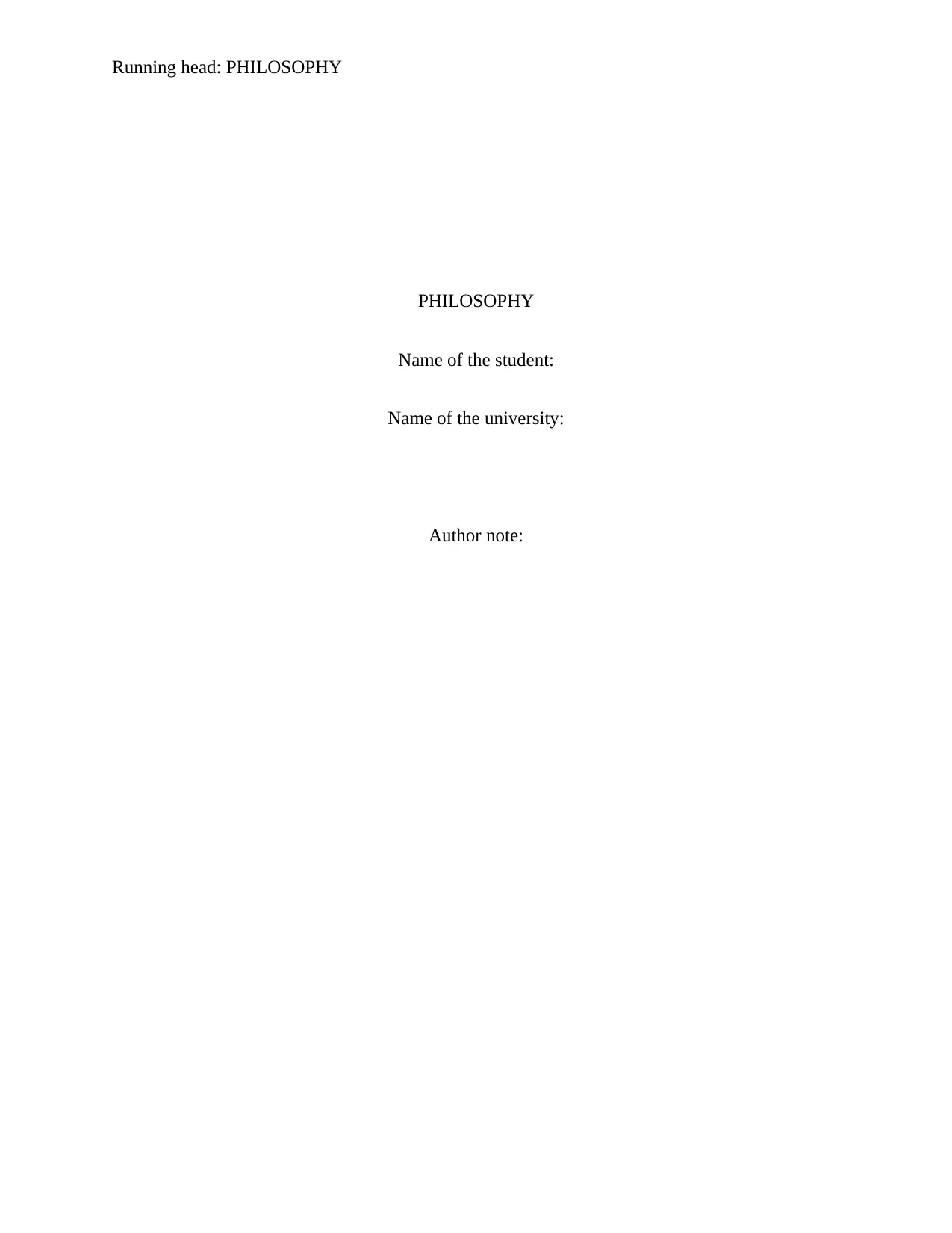
Running head: PHILOSOPHY
PHILOSOPHY
Name of the student:
Name of the university:
Author note:
PHILOSOPHY
Name of the student:
Name of the university:
Author note:
Paraphrase This Document
Need a fresh take? Get an instant paraphrase of this document with our AI Paraphraser
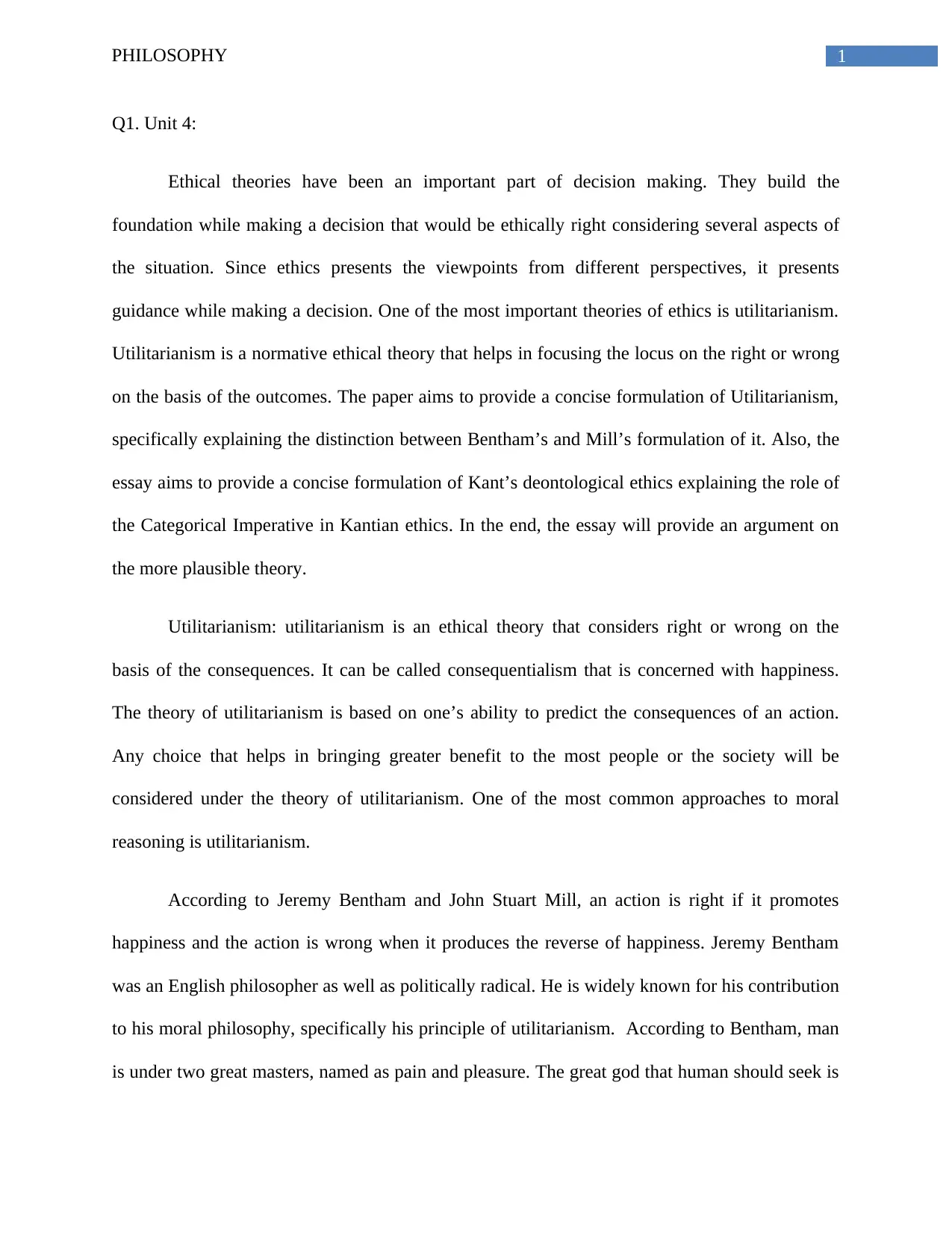
1PHILOSOPHY
Q1. Unit 4:
Ethical theories have been an important part of decision making. They build the
foundation while making a decision that would be ethically right considering several aspects of
the situation. Since ethics presents the viewpoints from different perspectives, it presents
guidance while making a decision. One of the most important theories of ethics is utilitarianism.
Utilitarianism is a normative ethical theory that helps in focusing the locus on the right or wrong
on the basis of the outcomes. The paper aims to provide a concise formulation of Utilitarianism,
specifically explaining the distinction between Bentham’s and Mill’s formulation of it. Also, the
essay aims to provide a concise formulation of Kant’s deontological ethics explaining the role of
the Categorical Imperative in Kantian ethics. In the end, the essay will provide an argument on
the more plausible theory.
Utilitarianism: utilitarianism is an ethical theory that considers right or wrong on the
basis of the consequences. It can be called consequentialism that is concerned with happiness.
The theory of utilitarianism is based on one’s ability to predict the consequences of an action.
Any choice that helps in bringing greater benefit to the most people or the society will be
considered under the theory of utilitarianism. One of the most common approaches to moral
reasoning is utilitarianism.
According to Jeremy Bentham and John Stuart Mill, an action is right if it promotes
happiness and the action is wrong when it produces the reverse of happiness. Jeremy Bentham
was an English philosopher as well as politically radical. He is widely known for his contribution
to his moral philosophy, specifically his principle of utilitarianism. According to Bentham, man
is under two great masters, named as pain and pleasure. The great god that human should seek is
Q1. Unit 4:
Ethical theories have been an important part of decision making. They build the
foundation while making a decision that would be ethically right considering several aspects of
the situation. Since ethics presents the viewpoints from different perspectives, it presents
guidance while making a decision. One of the most important theories of ethics is utilitarianism.
Utilitarianism is a normative ethical theory that helps in focusing the locus on the right or wrong
on the basis of the outcomes. The paper aims to provide a concise formulation of Utilitarianism,
specifically explaining the distinction between Bentham’s and Mill’s formulation of it. Also, the
essay aims to provide a concise formulation of Kant’s deontological ethics explaining the role of
the Categorical Imperative in Kantian ethics. In the end, the essay will provide an argument on
the more plausible theory.
Utilitarianism: utilitarianism is an ethical theory that considers right or wrong on the
basis of the consequences. It can be called consequentialism that is concerned with happiness.
The theory of utilitarianism is based on one’s ability to predict the consequences of an action.
Any choice that helps in bringing greater benefit to the most people or the society will be
considered under the theory of utilitarianism. One of the most common approaches to moral
reasoning is utilitarianism.
According to Jeremy Bentham and John Stuart Mill, an action is right if it promotes
happiness and the action is wrong when it produces the reverse of happiness. Jeremy Bentham
was an English philosopher as well as politically radical. He is widely known for his contribution
to his moral philosophy, specifically his principle of utilitarianism. According to Bentham, man
is under two great masters, named as pain and pleasure. The great god that human should seek is
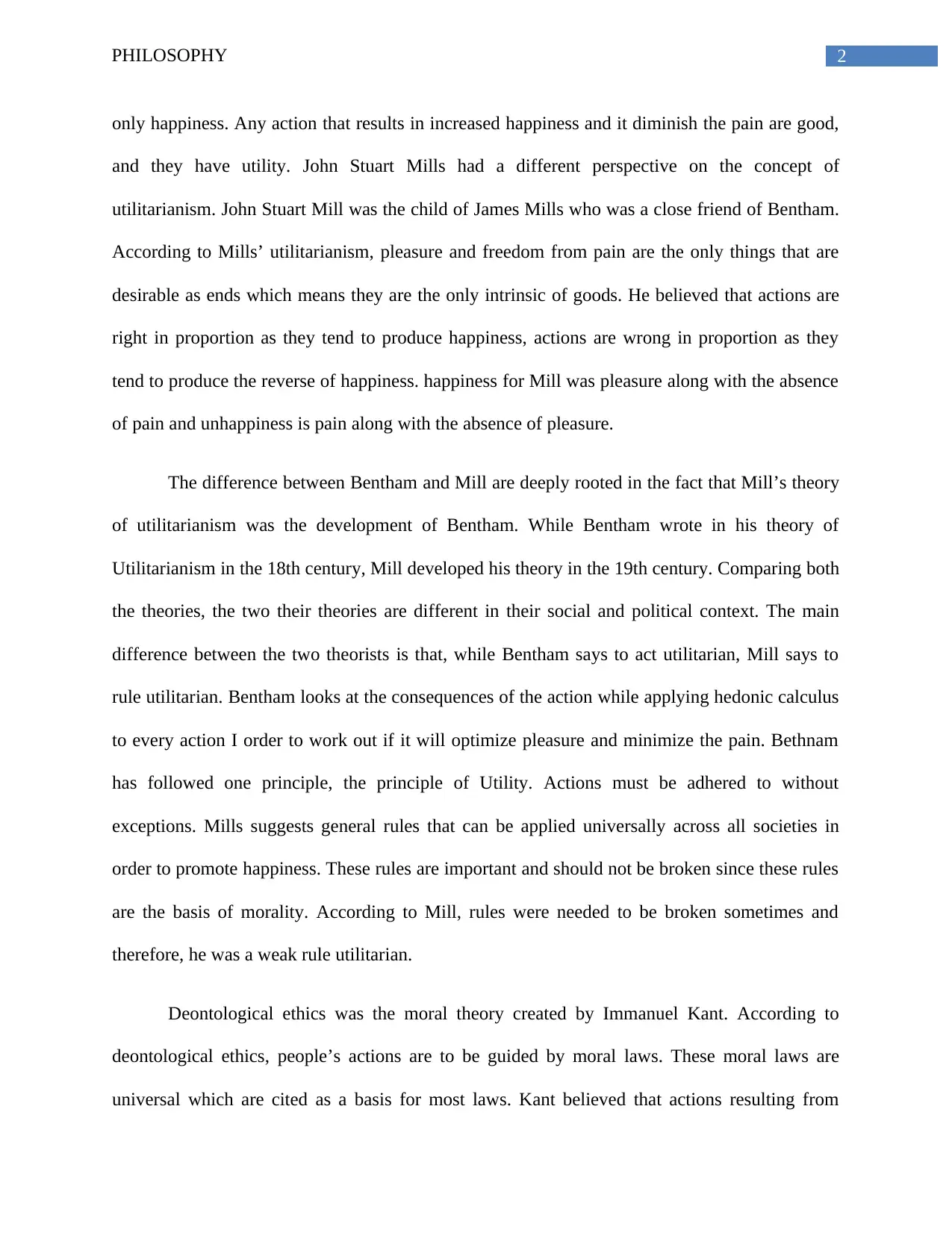
2PHILOSOPHY
only happiness. Any action that results in increased happiness and it diminish the pain are good,
and they have utility. John Stuart Mills had a different perspective on the concept of
utilitarianism. John Stuart Mill was the child of James Mills who was a close friend of Bentham.
According to Mills’ utilitarianism, pleasure and freedom from pain are the only things that are
desirable as ends which means they are the only intrinsic of goods. He believed that actions are
right in proportion as they tend to produce happiness, actions are wrong in proportion as they
tend to produce the reverse of happiness. happiness for Mill was pleasure along with the absence
of pain and unhappiness is pain along with the absence of pleasure.
The difference between Bentham and Mill are deeply rooted in the fact that Mill’s theory
of utilitarianism was the development of Bentham. While Bentham wrote in his theory of
Utilitarianism in the 18th century, Mill developed his theory in the 19th century. Comparing both
the theories, the two their theories are different in their social and political context. The main
difference between the two theorists is that, while Bentham says to act utilitarian, Mill says to
rule utilitarian. Bentham looks at the consequences of the action while applying hedonic calculus
to every action I order to work out if it will optimize pleasure and minimize the pain. Bethnam
has followed one principle, the principle of Utility. Actions must be adhered to without
exceptions. Mills suggests general rules that can be applied universally across all societies in
order to promote happiness. These rules are important and should not be broken since these rules
are the basis of morality. According to Mill, rules were needed to be broken sometimes and
therefore, he was a weak rule utilitarian.
Deontological ethics was the moral theory created by Immanuel Kant. According to
deontological ethics, people’s actions are to be guided by moral laws. These moral laws are
universal which are cited as a basis for most laws. Kant believed that actions resulting from
only happiness. Any action that results in increased happiness and it diminish the pain are good,
and they have utility. John Stuart Mills had a different perspective on the concept of
utilitarianism. John Stuart Mill was the child of James Mills who was a close friend of Bentham.
According to Mills’ utilitarianism, pleasure and freedom from pain are the only things that are
desirable as ends which means they are the only intrinsic of goods. He believed that actions are
right in proportion as they tend to produce happiness, actions are wrong in proportion as they
tend to produce the reverse of happiness. happiness for Mill was pleasure along with the absence
of pain and unhappiness is pain along with the absence of pleasure.
The difference between Bentham and Mill are deeply rooted in the fact that Mill’s theory
of utilitarianism was the development of Bentham. While Bentham wrote in his theory of
Utilitarianism in the 18th century, Mill developed his theory in the 19th century. Comparing both
the theories, the two their theories are different in their social and political context. The main
difference between the two theorists is that, while Bentham says to act utilitarian, Mill says to
rule utilitarian. Bentham looks at the consequences of the action while applying hedonic calculus
to every action I order to work out if it will optimize pleasure and minimize the pain. Bethnam
has followed one principle, the principle of Utility. Actions must be adhered to without
exceptions. Mills suggests general rules that can be applied universally across all societies in
order to promote happiness. These rules are important and should not be broken since these rules
are the basis of morality. According to Mill, rules were needed to be broken sometimes and
therefore, he was a weak rule utilitarian.
Deontological ethics was the moral theory created by Immanuel Kant. According to
deontological ethics, people’s actions are to be guided by moral laws. These moral laws are
universal which are cited as a basis for most laws. Kant believed that actions resulting from
⊘ This is a preview!⊘
Do you want full access?
Subscribe today to unlock all pages.

Trusted by 1+ million students worldwide
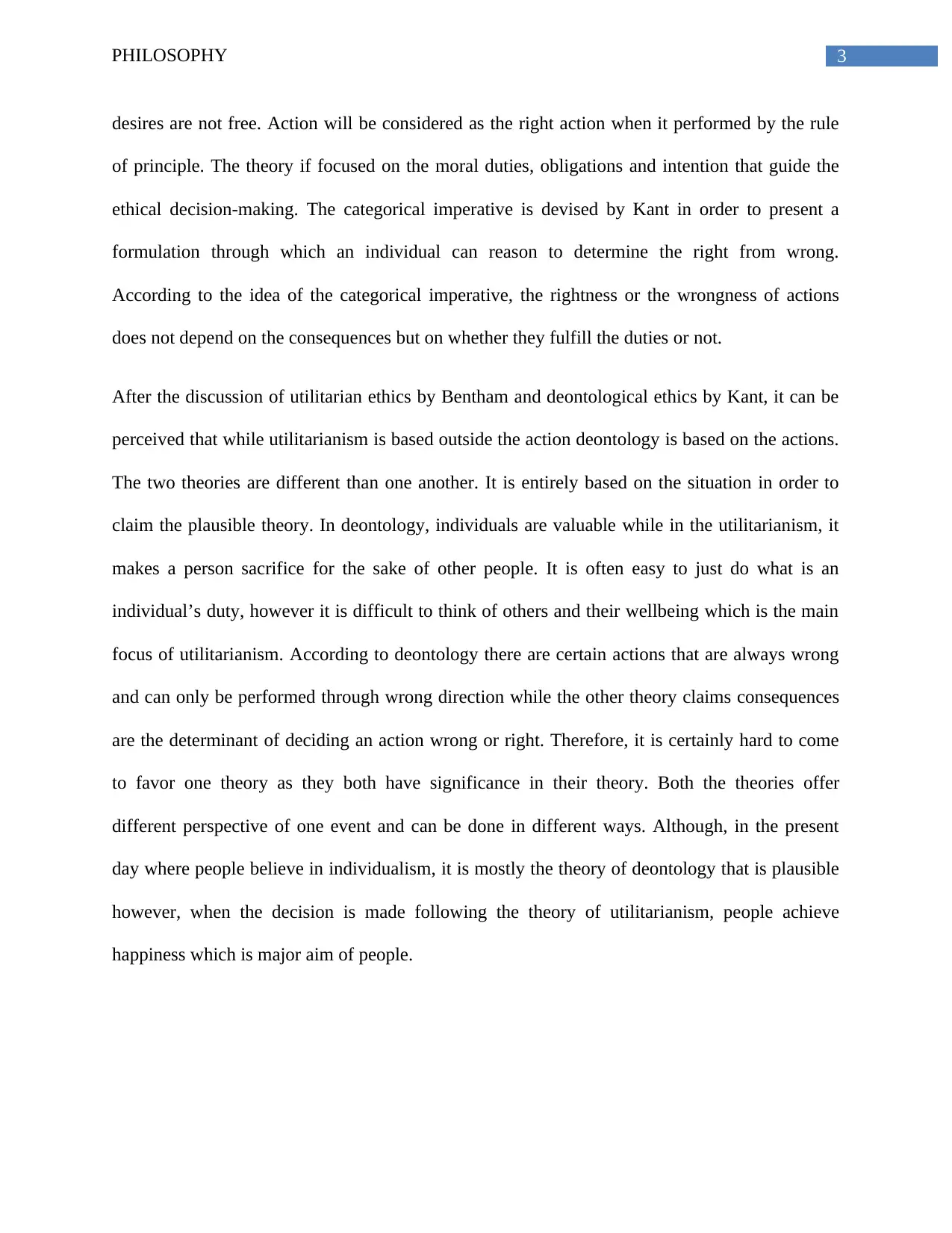
3PHILOSOPHY
desires are not free. Action will be considered as the right action when it performed by the rule
of principle. The theory if focused on the moral duties, obligations and intention that guide the
ethical decision-making. The categorical imperative is devised by Kant in order to present a
formulation through which an individual can reason to determine the right from wrong.
According to the idea of the categorical imperative, the rightness or the wrongness of actions
does not depend on the consequences but on whether they fulfill the duties or not.
After the discussion of utilitarian ethics by Bentham and deontological ethics by Kant, it can be
perceived that while utilitarianism is based outside the action deontology is based on the actions.
The two theories are different than one another. It is entirely based on the situation in order to
claim the plausible theory. In deontology, individuals are valuable while in the utilitarianism, it
makes a person sacrifice for the sake of other people. It is often easy to just do what is an
individual’s duty, however it is difficult to think of others and their wellbeing which is the main
focus of utilitarianism. According to deontology there are certain actions that are always wrong
and can only be performed through wrong direction while the other theory claims consequences
are the determinant of deciding an action wrong or right. Therefore, it is certainly hard to come
to favor one theory as they both have significance in their theory. Both the theories offer
different perspective of one event and can be done in different ways. Although, in the present
day where people believe in individualism, it is mostly the theory of deontology that is plausible
however, when the decision is made following the theory of utilitarianism, people achieve
happiness which is major aim of people.
desires are not free. Action will be considered as the right action when it performed by the rule
of principle. The theory if focused on the moral duties, obligations and intention that guide the
ethical decision-making. The categorical imperative is devised by Kant in order to present a
formulation through which an individual can reason to determine the right from wrong.
According to the idea of the categorical imperative, the rightness or the wrongness of actions
does not depend on the consequences but on whether they fulfill the duties or not.
After the discussion of utilitarian ethics by Bentham and deontological ethics by Kant, it can be
perceived that while utilitarianism is based outside the action deontology is based on the actions.
The two theories are different than one another. It is entirely based on the situation in order to
claim the plausible theory. In deontology, individuals are valuable while in the utilitarianism, it
makes a person sacrifice for the sake of other people. It is often easy to just do what is an
individual’s duty, however it is difficult to think of others and their wellbeing which is the main
focus of utilitarianism. According to deontology there are certain actions that are always wrong
and can only be performed through wrong direction while the other theory claims consequences
are the determinant of deciding an action wrong or right. Therefore, it is certainly hard to come
to favor one theory as they both have significance in their theory. Both the theories offer
different perspective of one event and can be done in different ways. Although, in the present
day where people believe in individualism, it is mostly the theory of deontology that is plausible
however, when the decision is made following the theory of utilitarianism, people achieve
happiness which is major aim of people.
Paraphrase This Document
Need a fresh take? Get an instant paraphrase of this document with our AI Paraphraser
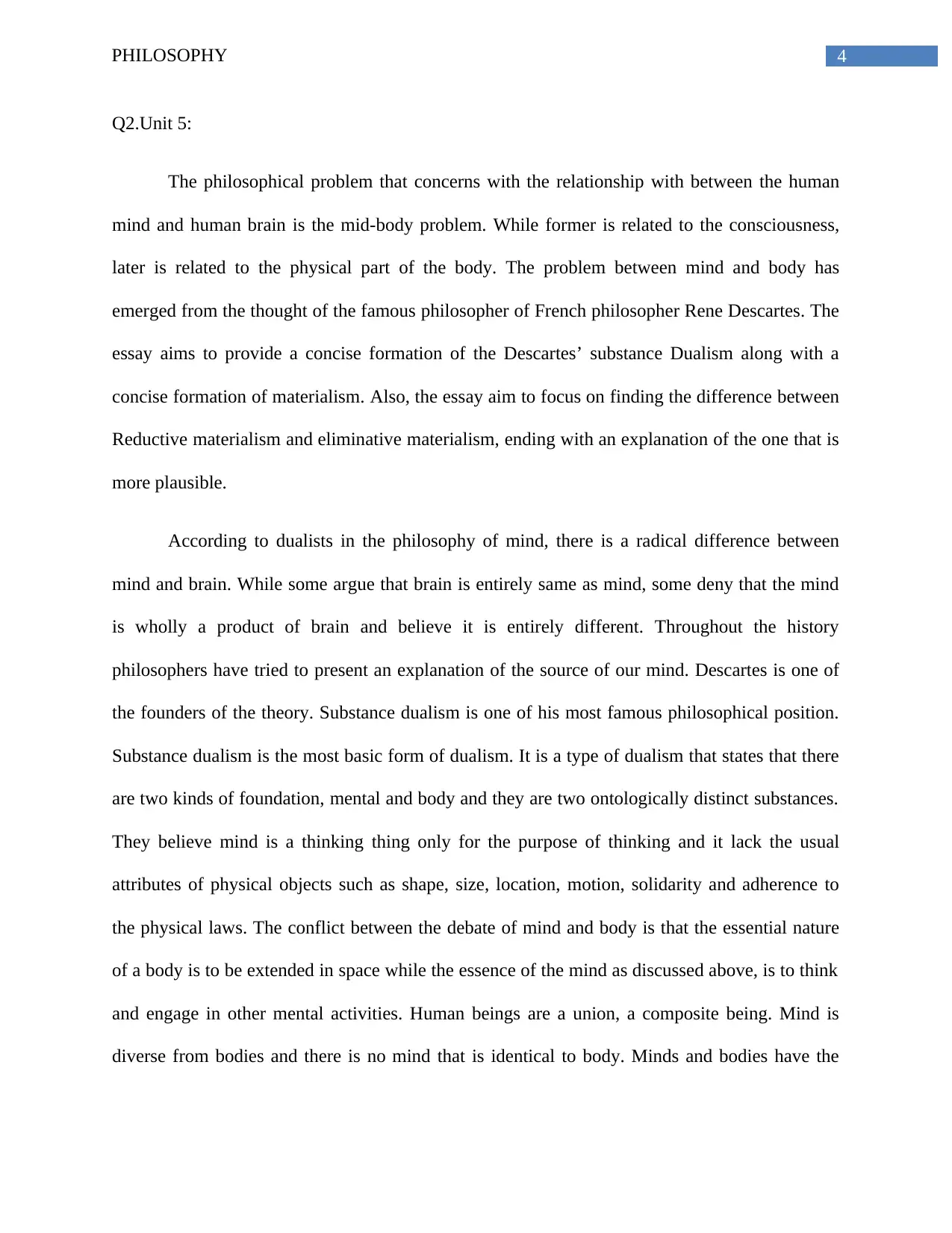
4PHILOSOPHY
Q2.Unit 5:
The philosophical problem that concerns with the relationship with between the human
mind and human brain is the mid-body problem. While former is related to the consciousness,
later is related to the physical part of the body. The problem between mind and body has
emerged from the thought of the famous philosopher of French philosopher Rene Descartes. The
essay aims to provide a concise formation of the Descartes’ substance Dualism along with a
concise formation of materialism. Also, the essay aim to focus on finding the difference between
Reductive materialism and eliminative materialism, ending with an explanation of the one that is
more plausible.
According to dualists in the philosophy of mind, there is a radical difference between
mind and brain. While some argue that brain is entirely same as mind, some deny that the mind
is wholly a product of brain and believe it is entirely different. Throughout the history
philosophers have tried to present an explanation of the source of our mind. Descartes is one of
the founders of the theory. Substance dualism is one of his most famous philosophical position.
Substance dualism is the most basic form of dualism. It is a type of dualism that states that there
are two kinds of foundation, mental and body and they are two ontologically distinct substances.
They believe mind is a thinking thing only for the purpose of thinking and it lack the usual
attributes of physical objects such as shape, size, location, motion, solidarity and adherence to
the physical laws. The conflict between the debate of mind and body is that the essential nature
of a body is to be extended in space while the essence of the mind as discussed above, is to think
and engage in other mental activities. Human beings are a union, a composite being. Mind is
diverse from bodies and there is no mind that is identical to body. Minds and bodies have the
Q2.Unit 5:
The philosophical problem that concerns with the relationship with between the human
mind and human brain is the mid-body problem. While former is related to the consciousness,
later is related to the physical part of the body. The problem between mind and body has
emerged from the thought of the famous philosopher of French philosopher Rene Descartes. The
essay aims to provide a concise formation of the Descartes’ substance Dualism along with a
concise formation of materialism. Also, the essay aim to focus on finding the difference between
Reductive materialism and eliminative materialism, ending with an explanation of the one that is
more plausible.
According to dualists in the philosophy of mind, there is a radical difference between
mind and brain. While some argue that brain is entirely same as mind, some deny that the mind
is wholly a product of brain and believe it is entirely different. Throughout the history
philosophers have tried to present an explanation of the source of our mind. Descartes is one of
the founders of the theory. Substance dualism is one of his most famous philosophical position.
Substance dualism is the most basic form of dualism. It is a type of dualism that states that there
are two kinds of foundation, mental and body and they are two ontologically distinct substances.
They believe mind is a thinking thing only for the purpose of thinking and it lack the usual
attributes of physical objects such as shape, size, location, motion, solidarity and adherence to
the physical laws. The conflict between the debate of mind and body is that the essential nature
of a body is to be extended in space while the essence of the mind as discussed above, is to think
and engage in other mental activities. Human beings are a union, a composite being. Mind is
diverse from bodies and there is no mind that is identical to body. Minds and bodies have the
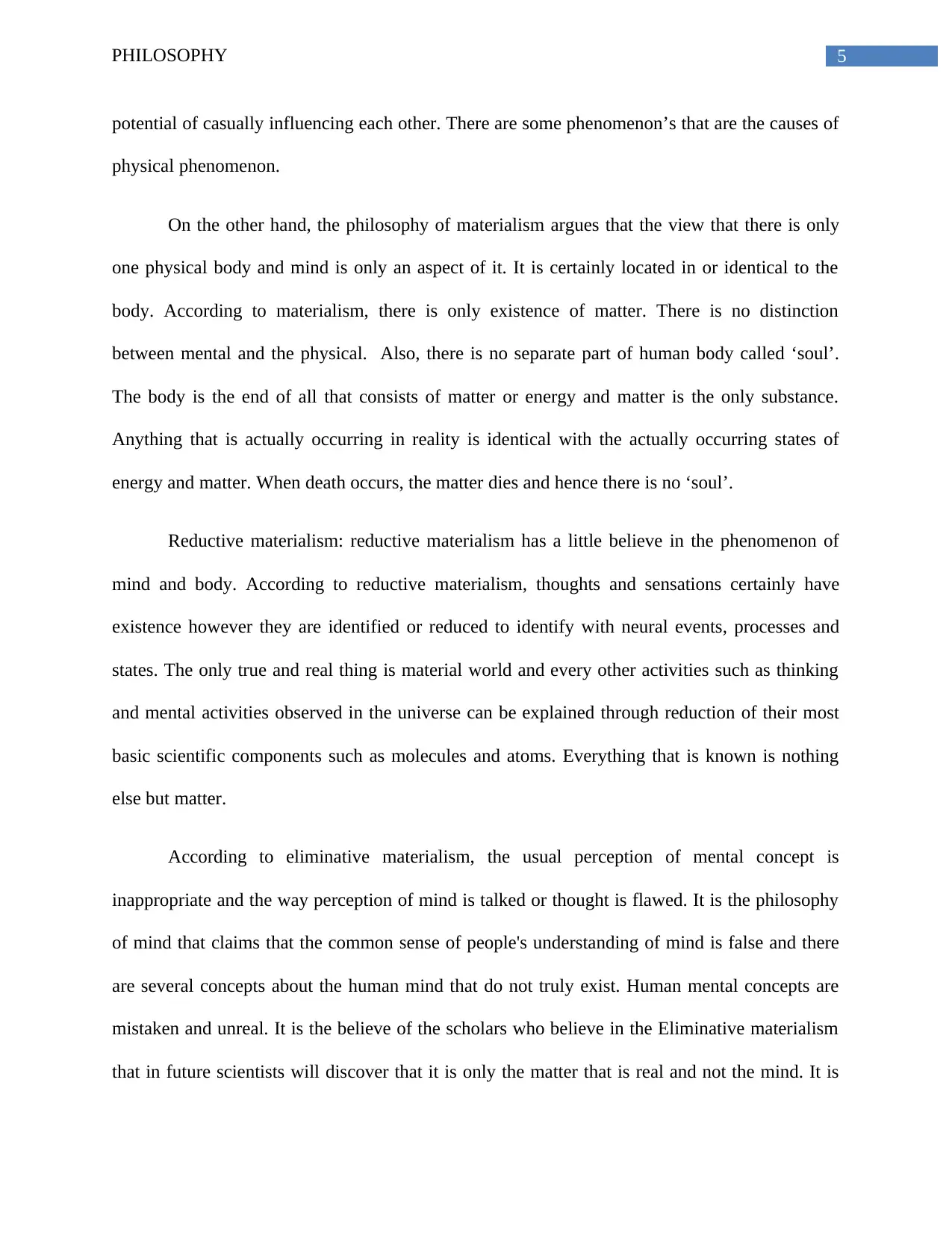
5PHILOSOPHY
potential of casually influencing each other. There are some phenomenon’s that are the causes of
physical phenomenon.
On the other hand, the philosophy of materialism argues that the view that there is only
one physical body and mind is only an aspect of it. It is certainly located in or identical to the
body. According to materialism, there is only existence of matter. There is no distinction
between mental and the physical. Also, there is no separate part of human body called ‘soul’.
The body is the end of all that consists of matter or energy and matter is the only substance.
Anything that is actually occurring in reality is identical with the actually occurring states of
energy and matter. When death occurs, the matter dies and hence there is no ‘soul’.
Reductive materialism: reductive materialism has a little believe in the phenomenon of
mind and body. According to reductive materialism, thoughts and sensations certainly have
existence however they are identified or reduced to identify with neural events, processes and
states. The only true and real thing is material world and every other activities such as thinking
and mental activities observed in the universe can be explained through reduction of their most
basic scientific components such as molecules and atoms. Everything that is known is nothing
else but matter.
According to eliminative materialism, the usual perception of mental concept is
inappropriate and the way perception of mind is talked or thought is flawed. It is the philosophy
of mind that claims that the common sense of people's understanding of mind is false and there
are several concepts about the human mind that do not truly exist. Human mental concepts are
mistaken and unreal. It is the believe of the scholars who believe in the Eliminative materialism
that in future scientists will discover that it is only the matter that is real and not the mind. It is
potential of casually influencing each other. There are some phenomenon’s that are the causes of
physical phenomenon.
On the other hand, the philosophy of materialism argues that the view that there is only
one physical body and mind is only an aspect of it. It is certainly located in or identical to the
body. According to materialism, there is only existence of matter. There is no distinction
between mental and the physical. Also, there is no separate part of human body called ‘soul’.
The body is the end of all that consists of matter or energy and matter is the only substance.
Anything that is actually occurring in reality is identical with the actually occurring states of
energy and matter. When death occurs, the matter dies and hence there is no ‘soul’.
Reductive materialism: reductive materialism has a little believe in the phenomenon of
mind and body. According to reductive materialism, thoughts and sensations certainly have
existence however they are identified or reduced to identify with neural events, processes and
states. The only true and real thing is material world and every other activities such as thinking
and mental activities observed in the universe can be explained through reduction of their most
basic scientific components such as molecules and atoms. Everything that is known is nothing
else but matter.
According to eliminative materialism, the usual perception of mental concept is
inappropriate and the way perception of mind is talked or thought is flawed. It is the philosophy
of mind that claims that the common sense of people's understanding of mind is false and there
are several concepts about the human mind that do not truly exist. Human mental concepts are
mistaken and unreal. It is the believe of the scholars who believe in the Eliminative materialism
that in future scientists will discover that it is only the matter that is real and not the mind. It is
⊘ This is a preview!⊘
Do you want full access?
Subscribe today to unlock all pages.

Trusted by 1+ million students worldwide
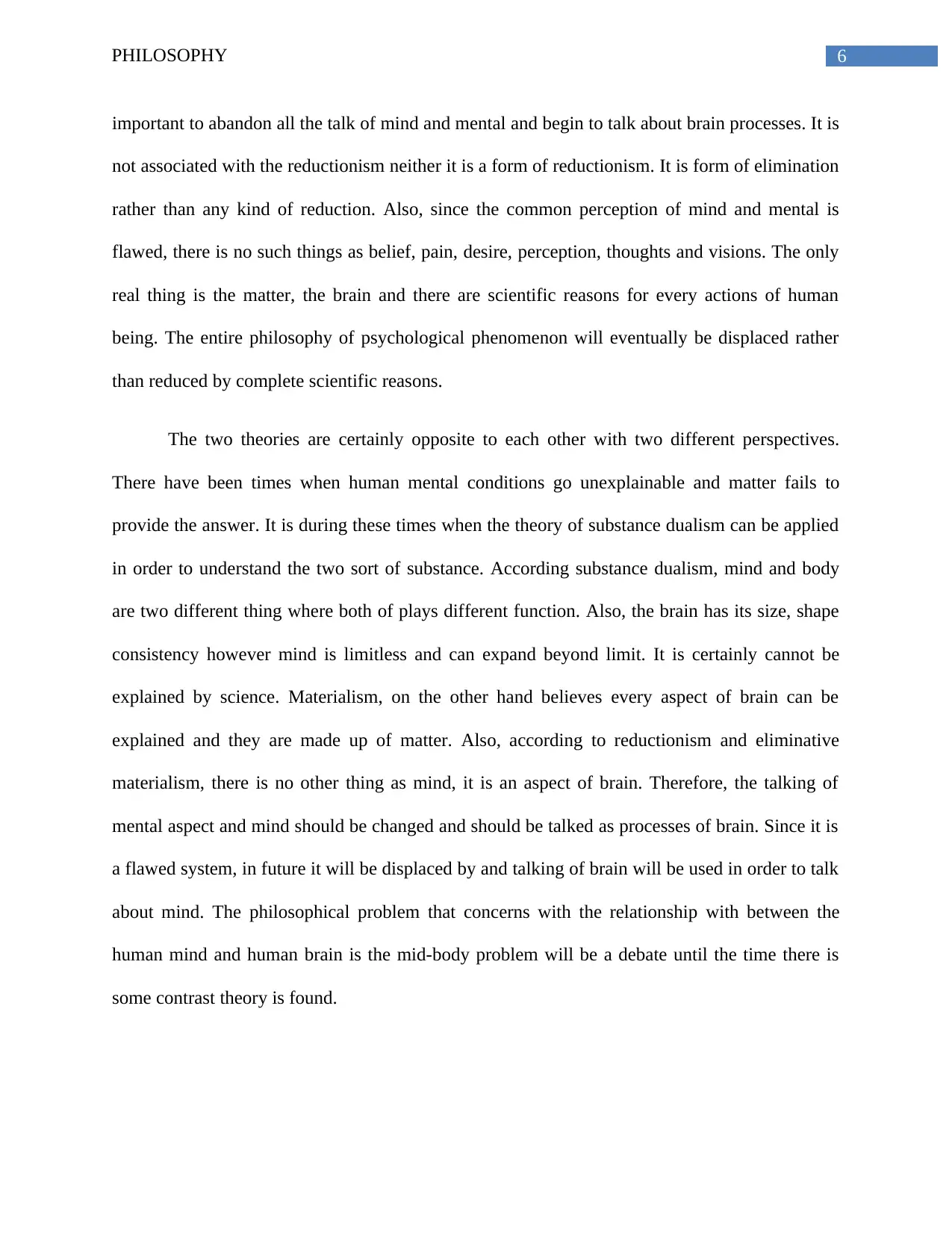
6PHILOSOPHY
important to abandon all the talk of mind and mental and begin to talk about brain processes. It is
not associated with the reductionism neither it is a form of reductionism. It is form of elimination
rather than any kind of reduction. Also, since the common perception of mind and mental is
flawed, there is no such things as belief, pain, desire, perception, thoughts and visions. The only
real thing is the matter, the brain and there are scientific reasons for every actions of human
being. The entire philosophy of psychological phenomenon will eventually be displaced rather
than reduced by complete scientific reasons.
The two theories are certainly opposite to each other with two different perspectives.
There have been times when human mental conditions go unexplainable and matter fails to
provide the answer. It is during these times when the theory of substance dualism can be applied
in order to understand the two sort of substance. According substance dualism, mind and body
are two different thing where both of plays different function. Also, the brain has its size, shape
consistency however mind is limitless and can expand beyond limit. It is certainly cannot be
explained by science. Materialism, on the other hand believes every aspect of brain can be
explained and they are made up of matter. Also, according to reductionism and eliminative
materialism, there is no other thing as mind, it is an aspect of brain. Therefore, the talking of
mental aspect and mind should be changed and should be talked as processes of brain. Since it is
a flawed system, in future it will be displaced by and talking of brain will be used in order to talk
about mind. The philosophical problem that concerns with the relationship with between the
human mind and human brain is the mid-body problem will be a debate until the time there is
some contrast theory is found.
important to abandon all the talk of mind and mental and begin to talk about brain processes. It is
not associated with the reductionism neither it is a form of reductionism. It is form of elimination
rather than any kind of reduction. Also, since the common perception of mind and mental is
flawed, there is no such things as belief, pain, desire, perception, thoughts and visions. The only
real thing is the matter, the brain and there are scientific reasons for every actions of human
being. The entire philosophy of psychological phenomenon will eventually be displaced rather
than reduced by complete scientific reasons.
The two theories are certainly opposite to each other with two different perspectives.
There have been times when human mental conditions go unexplainable and matter fails to
provide the answer. It is during these times when the theory of substance dualism can be applied
in order to understand the two sort of substance. According substance dualism, mind and body
are two different thing where both of plays different function. Also, the brain has its size, shape
consistency however mind is limitless and can expand beyond limit. It is certainly cannot be
explained by science. Materialism, on the other hand believes every aspect of brain can be
explained and they are made up of matter. Also, according to reductionism and eliminative
materialism, there is no other thing as mind, it is an aspect of brain. Therefore, the talking of
mental aspect and mind should be changed and should be talked as processes of brain. Since it is
a flawed system, in future it will be displaced by and talking of brain will be used in order to talk
about mind. The philosophical problem that concerns with the relationship with between the
human mind and human brain is the mid-body problem will be a debate until the time there is
some contrast theory is found.
Paraphrase This Document
Need a fresh take? Get an instant paraphrase of this document with our AI Paraphraser
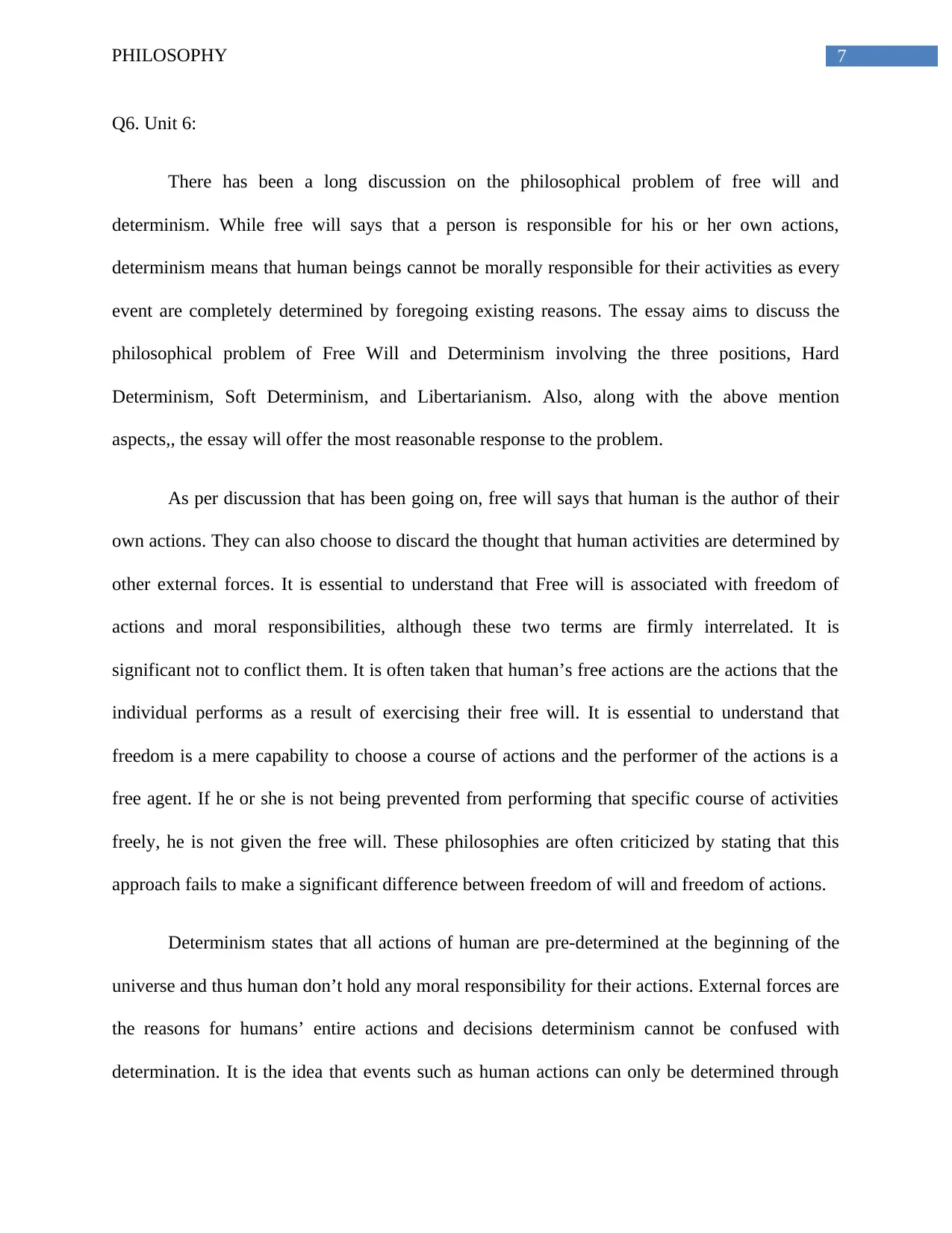
7PHILOSOPHY
Q6. Unit 6:
There has been a long discussion on the philosophical problem of free will and
determinism. While free will says that a person is responsible for his or her own actions,
determinism means that human beings cannot be morally responsible for their activities as every
event are completely determined by foregoing existing reasons. The essay aims to discuss the
philosophical problem of Free Will and Determinism involving the three positions, Hard
Determinism, Soft Determinism, and Libertarianism. Also, along with the above mention
aspects,, the essay will offer the most reasonable response to the problem.
As per discussion that has been going on, free will says that human is the author of their
own actions. They can also choose to discard the thought that human activities are determined by
other external forces. It is essential to understand that Free will is associated with freedom of
actions and moral responsibilities, although these two terms are firmly interrelated. It is
significant not to conflict them. It is often taken that human’s free actions are the actions that the
individual performs as a result of exercising their free will. It is essential to understand that
freedom is a mere capability to choose a course of actions and the performer of the actions is a
free agent. If he or she is not being prevented from performing that specific course of activities
freely, he is not given the free will. These philosophies are often criticized by stating that this
approach fails to make a significant difference between freedom of will and freedom of actions.
Determinism states that all actions of human are pre-determined at the beginning of the
universe and thus human don’t hold any moral responsibility for their actions. External forces are
the reasons for humans’ entire actions and decisions determinism cannot be confused with
determination. It is the idea that events such as human actions can only be determined through
Q6. Unit 6:
There has been a long discussion on the philosophical problem of free will and
determinism. While free will says that a person is responsible for his or her own actions,
determinism means that human beings cannot be morally responsible for their activities as every
event are completely determined by foregoing existing reasons. The essay aims to discuss the
philosophical problem of Free Will and Determinism involving the three positions, Hard
Determinism, Soft Determinism, and Libertarianism. Also, along with the above mention
aspects,, the essay will offer the most reasonable response to the problem.
As per discussion that has been going on, free will says that human is the author of their
own actions. They can also choose to discard the thought that human activities are determined by
other external forces. It is essential to understand that Free will is associated with freedom of
actions and moral responsibilities, although these two terms are firmly interrelated. It is
significant not to conflict them. It is often taken that human’s free actions are the actions that the
individual performs as a result of exercising their free will. It is essential to understand that
freedom is a mere capability to choose a course of actions and the performer of the actions is a
free agent. If he or she is not being prevented from performing that specific course of activities
freely, he is not given the free will. These philosophies are often criticized by stating that this
approach fails to make a significant difference between freedom of will and freedom of actions.
Determinism states that all actions of human are pre-determined at the beginning of the
universe and thus human don’t hold any moral responsibility for their actions. External forces are
the reasons for humans’ entire actions and decisions determinism cannot be confused with
determination. It is the idea that events such as human actions can only be determined through
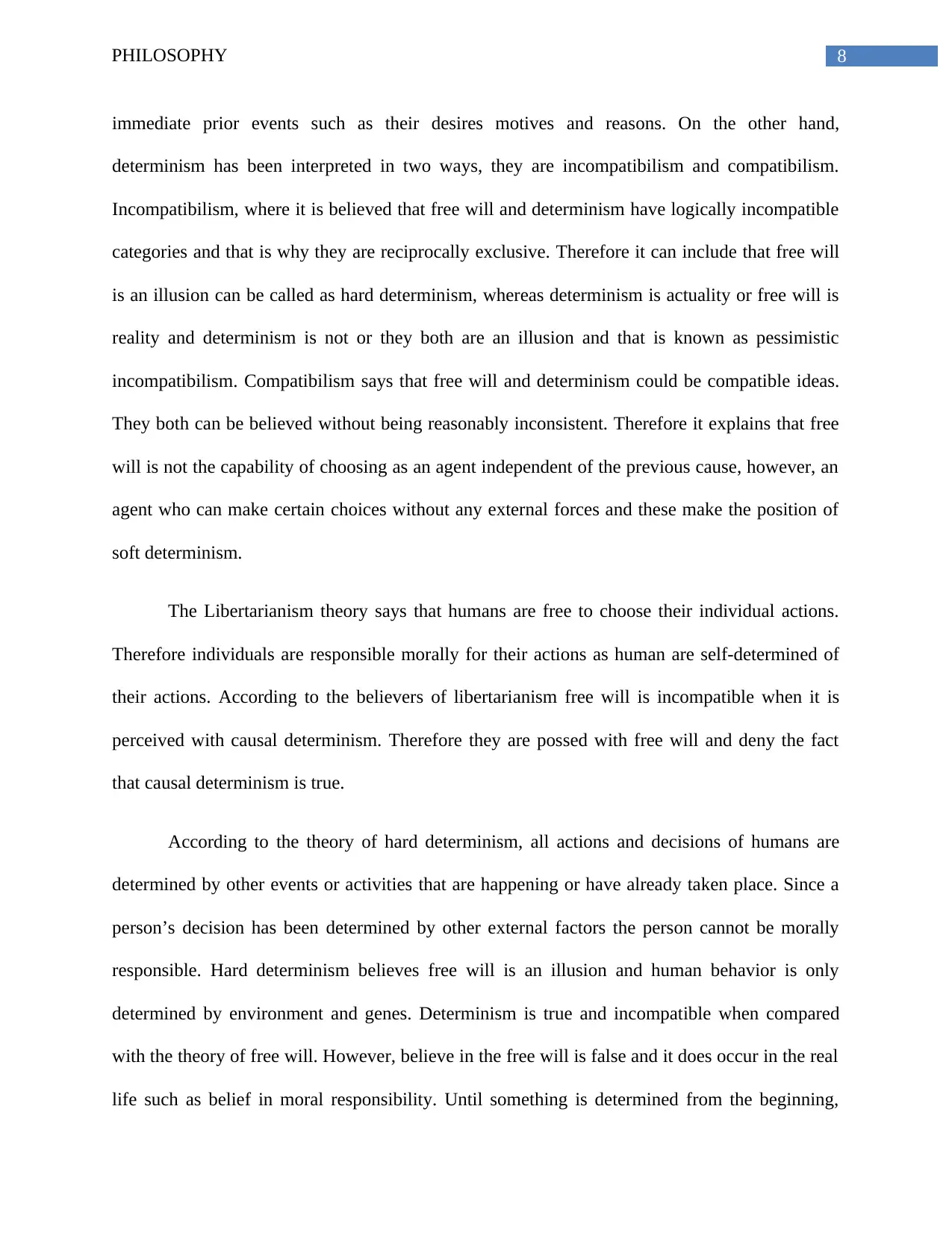
8PHILOSOPHY
immediate prior events such as their desires motives and reasons. On the other hand,
determinism has been interpreted in two ways, they are incompatibilism and compatibilism.
Incompatibilism, where it is believed that free will and determinism have logically incompatible
categories and that is why they are reciprocally exclusive. Therefore it can include that free will
is an illusion can be called as hard determinism, whereas determinism is actuality or free will is
reality and determinism is not or they both are an illusion and that is known as pessimistic
incompatibilism. Compatibilism says that free will and determinism could be compatible ideas.
They both can be believed without being reasonably inconsistent. Therefore it explains that free
will is not the capability of choosing as an agent independent of the previous cause, however, an
agent who can make certain choices without any external forces and these make the position of
soft determinism.
The Libertarianism theory says that humans are free to choose their individual actions.
Therefore individuals are responsible morally for their actions as human are self-determined of
their actions. According to the believers of libertarianism free will is incompatible when it is
perceived with causal determinism. Therefore they are possed with free will and deny the fact
that causal determinism is true.
According to the theory of hard determinism, all actions and decisions of humans are
determined by other events or activities that are happening or have already taken place. Since a
person’s decision has been determined by other external factors the person cannot be morally
responsible. Hard determinism believes free will is an illusion and human behavior is only
determined by environment and genes. Determinism is true and incompatible when compared
with the theory of free will. However, believe in the free will is false and it does occur in the real
life such as belief in moral responsibility. Until something is determined from the beginning,
immediate prior events such as their desires motives and reasons. On the other hand,
determinism has been interpreted in two ways, they are incompatibilism and compatibilism.
Incompatibilism, where it is believed that free will and determinism have logically incompatible
categories and that is why they are reciprocally exclusive. Therefore it can include that free will
is an illusion can be called as hard determinism, whereas determinism is actuality or free will is
reality and determinism is not or they both are an illusion and that is known as pessimistic
incompatibilism. Compatibilism says that free will and determinism could be compatible ideas.
They both can be believed without being reasonably inconsistent. Therefore it explains that free
will is not the capability of choosing as an agent independent of the previous cause, however, an
agent who can make certain choices without any external forces and these make the position of
soft determinism.
The Libertarianism theory says that humans are free to choose their individual actions.
Therefore individuals are responsible morally for their actions as human are self-determined of
their actions. According to the believers of libertarianism free will is incompatible when it is
perceived with causal determinism. Therefore they are possed with free will and deny the fact
that causal determinism is true.
According to the theory of hard determinism, all actions and decisions of humans are
determined by other events or activities that are happening or have already taken place. Since a
person’s decision has been determined by other external factors the person cannot be morally
responsible. Hard determinism believes free will is an illusion and human behavior is only
determined by environment and genes. Determinism is true and incompatible when compared
with the theory of free will. However, believe in the free will is false and it does occur in the real
life such as belief in moral responsibility. Until something is determined from the beginning,
⊘ This is a preview!⊘
Do you want full access?
Subscribe today to unlock all pages.

Trusted by 1+ million students worldwide
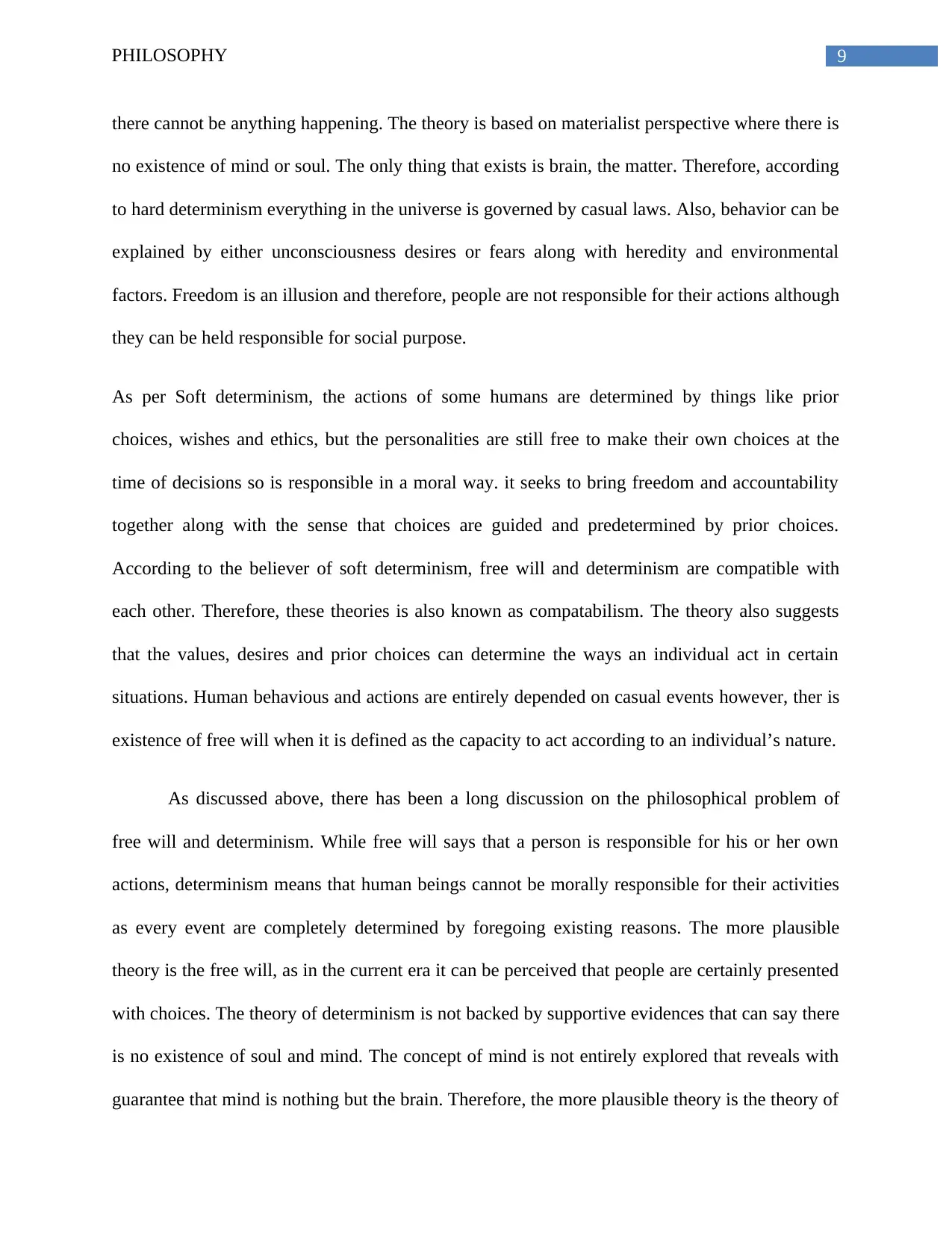
9PHILOSOPHY
there cannot be anything happening. The theory is based on materialist perspective where there is
no existence of mind or soul. The only thing that exists is brain, the matter. Therefore, according
to hard determinism everything in the universe is governed by casual laws. Also, behavior can be
explained by either unconsciousness desires or fears along with heredity and environmental
factors. Freedom is an illusion and therefore, people are not responsible for their actions although
they can be held responsible for social purpose.
As per Soft determinism, the actions of some humans are determined by things like prior
choices, wishes and ethics, but the personalities are still free to make their own choices at the
time of decisions so is responsible in a moral way. it seeks to bring freedom and accountability
together along with the sense that choices are guided and predetermined by prior choices.
According to the believer of soft determinism, free will and determinism are compatible with
each other. Therefore, these theories is also known as compatabilism. The theory also suggests
that the values, desires and prior choices can determine the ways an individual act in certain
situations. Human behavious and actions are entirely depended on casual events however, ther is
existence of free will when it is defined as the capacity to act according to an individual’s nature.
As discussed above, there has been a long discussion on the philosophical problem of
free will and determinism. While free will says that a person is responsible for his or her own
actions, determinism means that human beings cannot be morally responsible for their activities
as every event are completely determined by foregoing existing reasons. The more plausible
theory is the free will, as in the current era it can be perceived that people are certainly presented
with choices. The theory of determinism is not backed by supportive evidences that can say there
is no existence of soul and mind. The concept of mind is not entirely explored that reveals with
guarantee that mind is nothing but the brain. Therefore, the more plausible theory is the theory of
there cannot be anything happening. The theory is based on materialist perspective where there is
no existence of mind or soul. The only thing that exists is brain, the matter. Therefore, according
to hard determinism everything in the universe is governed by casual laws. Also, behavior can be
explained by either unconsciousness desires or fears along with heredity and environmental
factors. Freedom is an illusion and therefore, people are not responsible for their actions although
they can be held responsible for social purpose.
As per Soft determinism, the actions of some humans are determined by things like prior
choices, wishes and ethics, but the personalities are still free to make their own choices at the
time of decisions so is responsible in a moral way. it seeks to bring freedom and accountability
together along with the sense that choices are guided and predetermined by prior choices.
According to the believer of soft determinism, free will and determinism are compatible with
each other. Therefore, these theories is also known as compatabilism. The theory also suggests
that the values, desires and prior choices can determine the ways an individual act in certain
situations. Human behavious and actions are entirely depended on casual events however, ther is
existence of free will when it is defined as the capacity to act according to an individual’s nature.
As discussed above, there has been a long discussion on the philosophical problem of
free will and determinism. While free will says that a person is responsible for his or her own
actions, determinism means that human beings cannot be morally responsible for their activities
as every event are completely determined by foregoing existing reasons. The more plausible
theory is the free will, as in the current era it can be perceived that people are certainly presented
with choices. The theory of determinism is not backed by supportive evidences that can say there
is no existence of soul and mind. The concept of mind is not entirely explored that reveals with
guarantee that mind is nothing but the brain. Therefore, the more plausible theory is the theory of
Paraphrase This Document
Need a fresh take? Get an instant paraphrase of this document with our AI Paraphraser

10PHILOSOPHY
free will as well as liberalism since they possess the evidence of their aspect explaining the
theories.
free will as well as liberalism since they possess the evidence of their aspect explaining the
theories.
1 out of 11
Related Documents
Your All-in-One AI-Powered Toolkit for Academic Success.
+13062052269
info@desklib.com
Available 24*7 on WhatsApp / Email
![[object Object]](/_next/static/media/star-bottom.7253800d.svg)
Unlock your academic potential
Copyright © 2020–2026 A2Z Services. All Rights Reserved. Developed and managed by ZUCOL.





